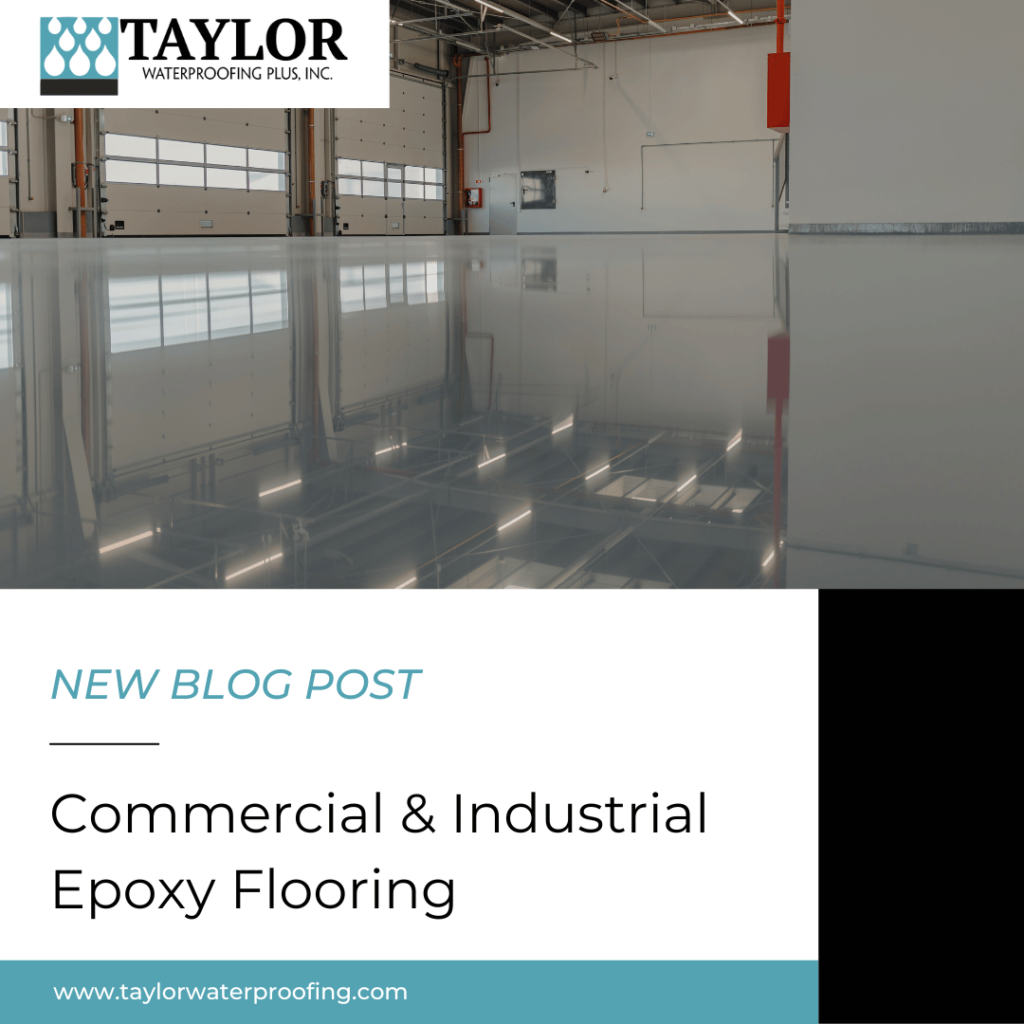
Commercial & Industrial Epoxy Flooring
Epoxy is a high-quality, long-lasting flooring option that is often used for commercial and industrial purposes. This flooring is easy to keep clean and can be used to resurface concrete floors that are porous and break down quicker than epoxy floors. The material is waterproof and seamless so is perfect for industries that work with spills or need a sterile working environment.
Here are some of the top benefits of commercial & industrial epoxy flooring uses.
Epoxy Flooring Benefits for Industrial Uses
Chemical-Resistant: In an industrial environment, such as a manufacturing plant or warehouse, chemicals may be part of the everyday routine. While this can cause damage to some types of flooring, epoxy is resistant to solvents, acids, alkalis, and corrosive materials.
Abrasion and Impact-Resistant: When you have an industrial business, heavy equipment and accidents, such as dropping tools, can cause scratches and damage to the floors. This makes epoxy a good option for high-traffic areas.
Longevity: Because of the benefits epoxy provides, it makes this flooring extremely durable. This helps customers in the industrial industries save money and reduce the cost of maintenance.
Epoxy is perfect for warehouses, manufacturing plants, auto services, research labs, sterile areas, and more.
Epoxy Flooring Benefits for Commercial Uses
Slip-resistant: If you have a commercial or retail business, you want to keep your employees and customers safe while also protecting your company. Having slip-resistant flooring like epoxy is a great way to prevent and reduce slips and falls.
Decorative Options: Epoxy comes in many colors and patterns. It is a great way to spruce up your building or business while also getting tons of practical benefits.
Easy to Clean and Stain-Resistant: Epoxy looks good year after year and is easy to maintain. This flooring is perfect for businesses looking to maximize their investments.
Epoxy is perfect for commercial kitchens, retail stores, hotels, hallways, and more.
To talk to one of our team members about commercial & industrial epoxy flooring, or your building’s waterproofing needs, contact us through our website here.
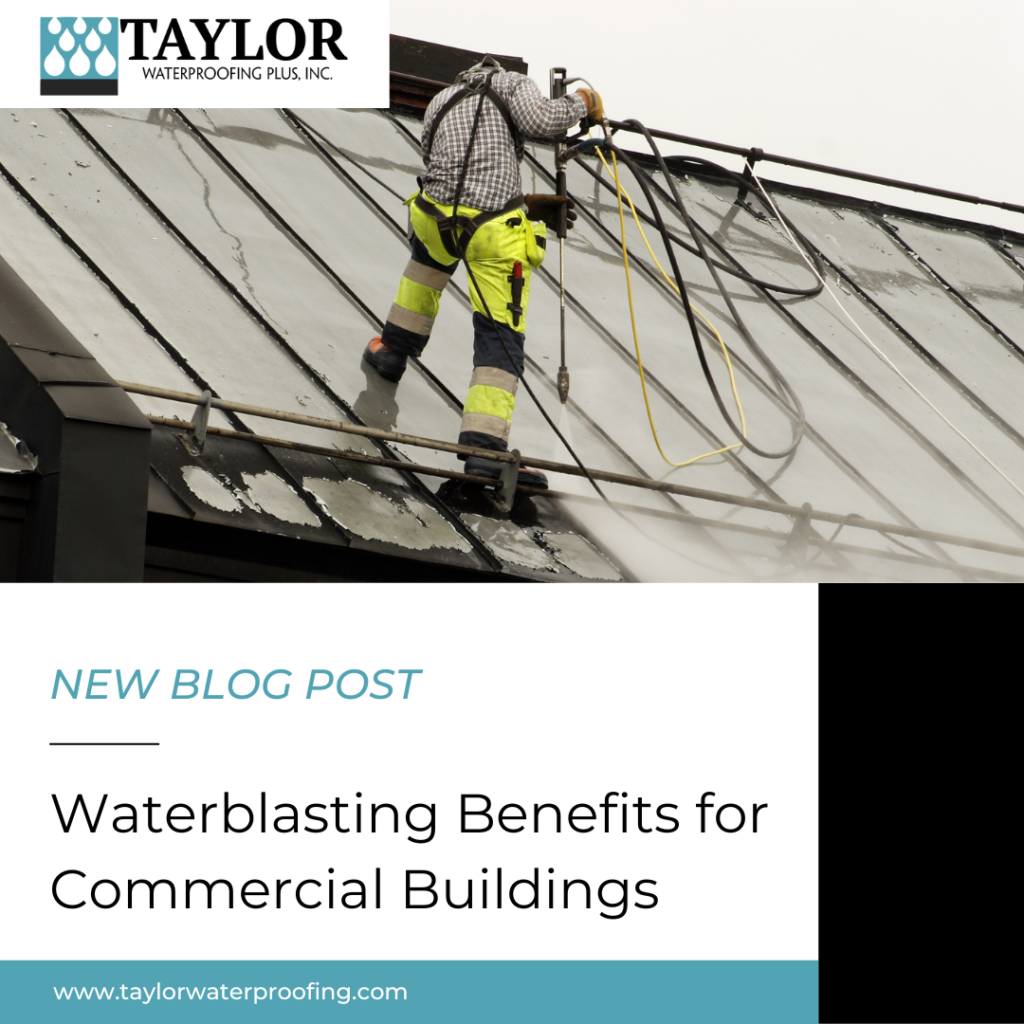
Waterblasting Benefits for Commercial Buildings
There are many waterblasting benefits that can help your commercial building stay in good condition. Waterblasting is a popular way to clean commercial buildings. This method of cleaning comes with many benefits to improve the look of your building and help you save money on repairs. It uses a high-pressure nozzle to spray water. When done at this level of pressure, it removes stains and pollutants without toxic or abrasive chemicals.
Waterblasting Benefits
Maintenance – Waterblasting cuts down on the need for future repairs and is a great way to maintain your commercial building. This reduces your overall maintenance and repair costs.
Sealant or Coating Prep – If you are having a sealant or coating applied or reapplied, it’s a great way to prep the area or wall. It cleans off dirt, grime, and oils that could prevent the coating from adhering.
Versatile – Waterblasting can be done on many different materials without negatively affecting the building. Waterblasting can be used for cleaning concrete, wood, stones, metal, and more. It can also be used on walls, floors, driveways, and other areas of your property.
Aesthetics – When your building is clean, it looks nice and attractive. Waterblasting removes mold, stains, dirt, grease, mildew, and old paint. Not only does this help with the look of your building but it can also raise your property value.
Health and Safety – Mold and mildew are safety concerns for your building’s occupants. If left untreated, the mold and mildew could work their way into the interior of your building and negatively impact the occupants’ health.
Waterblasting is a great way to improve your building’s appearance and cut down on repair costs. It is a great addition to your building’s waterproofing regiment and regular maintenance. Contact us here to learn more about waterblasting benefits and if it would be a good option for your building.
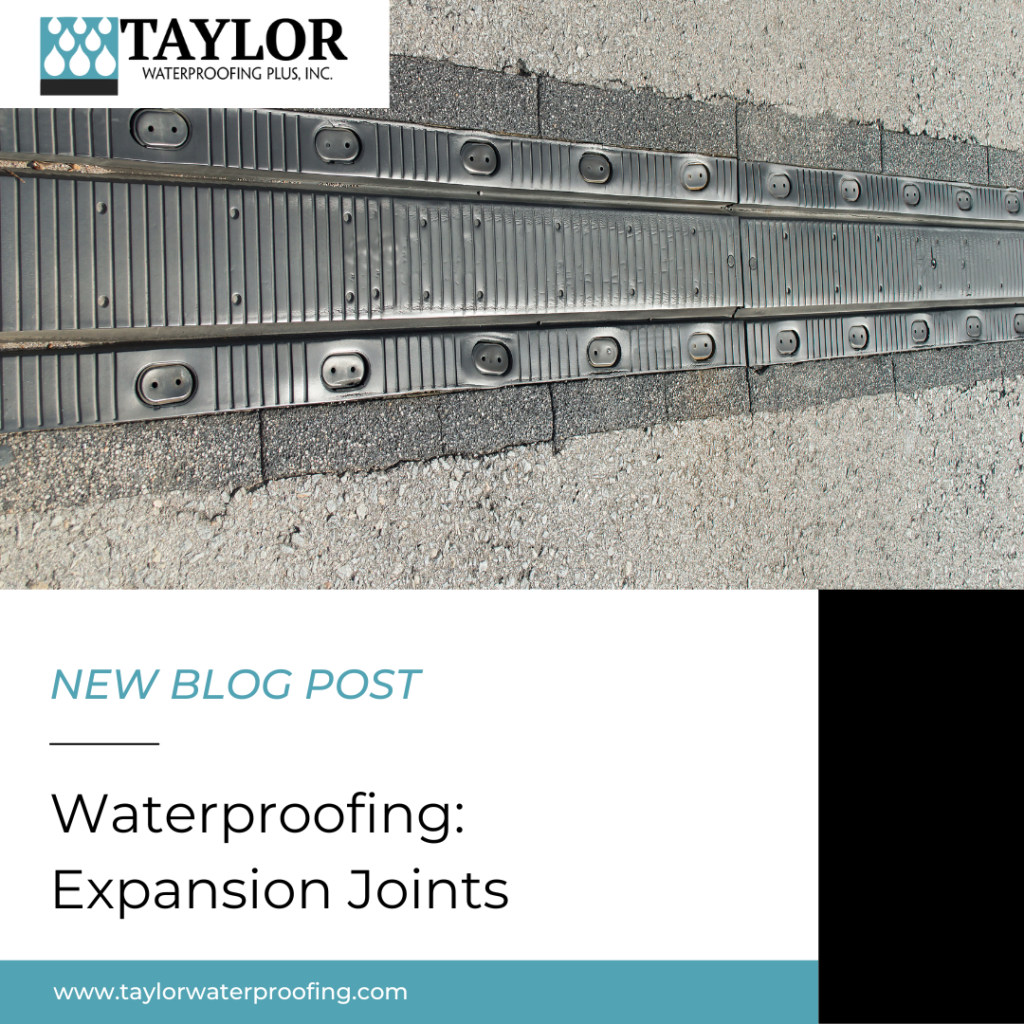
Waterproofing: Expansion Joints
When temperatures rise and fall, buildings can expand and contract. Expansion joints are built into the building’s walls, floors, and roofs. Without these joints, the concrete or bricks could break and crack over time as the building shifts. They also absorb vibration and help the building withstand stresses. It is important to make sure these joints are properly waterproofed.
Why Do You Need to Waterproof Expansion Joints?
If an expansion joint isn’t waterproofed correctly, water can infiltrate the concrete or wall, causing water damage. If water soaks into the concrete through the pores, it can corrode the steel reinforcing bars. If water gets into the building through the roof or wall expansion joints, it can cause mold and mildew growth, water stains, and weaken the structure over time.
How We Waterproof Expansion Joints
Waterproofing materials and methods will depend on the type of expansion joint being waterproofed but there are general steps to follow.
Clean the Joint – Remove any debris, dirt, or loose material from the joint. This will ensure a clean base and help the sealant stay in place.
Apply a Primer – Once the area is dry from cleaning, we apply the proper primer to the joint. This ensures proper adhesion of the waterproofing material.
Choose the Sealant – There are many options when it comes to sealants and waterproofing materials. Our team will choose the appropriate material for your specific joint. This could include silicone, polyurethane, or a specialized joint sealant.
Apply the Sealant – When applying the sealant to the joint, we make sure to fill any gaps or cracks. Our team will smooth out the sealant using a putty knife or other tool and remove any excess with solvent so that the area looks clean and professionally done.
It is very important to make sure that the expansion joints in your building are waterproofed and not vulnerable to water infiltration. This will protect your building from water damage. Our team can waterproof your building’s expansion joints and make sure there are no other areas that need addressing. Contact us through our website here to learn more about how we can help protect your building.
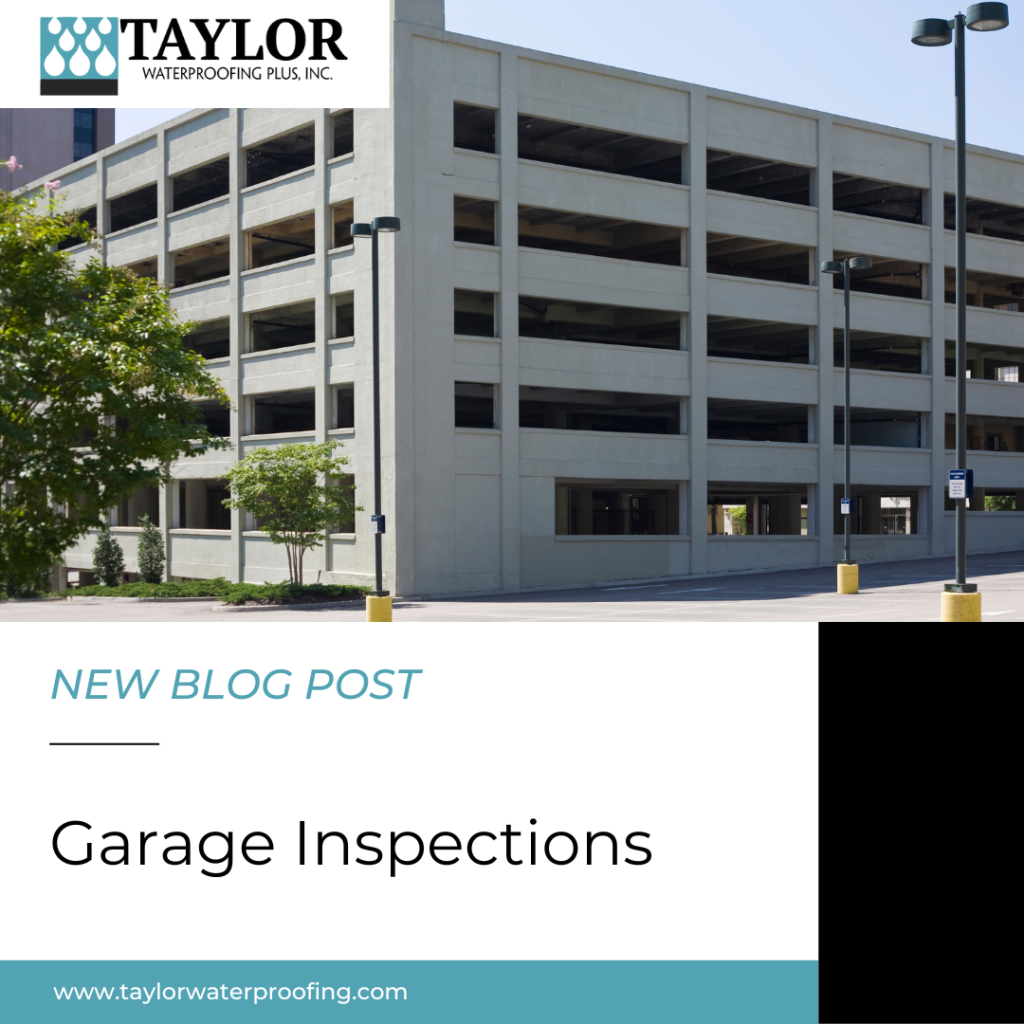
Garage Inspections
A parking garage is part of your building and an asset you will want to protect. It is a good idea to have your garage inspected at least annually. Garage inspections will ensure that minor problems don’t turn into larger repairs later down the road.
When our team conducts an inspection, we make sure that the concrete and structure of the garage are in good condition. Here are some of the items we check when we perform a parking garage inspection:
Concrete – Our team will check all concrete areas of the garage to see if any issues need addressing. This includes concrete slabs, walls, and support beams. Signs of concrete damage include cracks, white or rust stains, chipping or flaking, exposed steel rebar, and water stains. Concrete can become damaged in various ways, but a lot of damage can be caused by water infiltration and improper coating.
Drainage – If your garage has drainage issues, it can cause the structure to deteriorate. A team member will check to see if the drain is clogged or if there is any standing water in the garage. When water pools on the surface of the concrete, it can break down the structure and cause potholes, and standing water can potentially be a health concern for you and your customers.
Expansion Joints – These are joints that are built into the structure. They sit between concrete slabs and allow for movement in a garage or building. Expansion joints can become a place of water infiltration if not properly sealed and can fail due to age, mechanical damage, or incorrect design or installation. Our team will check to see if there are any signs of damage, such as rust around the joint or cracks.
It is very important to make sure your parking garage is structurally sound and in good condition. This will help protect the occupants who use the garage and your investment. To learn more about parking garage inspections and how our team can help, contact us through our website here.
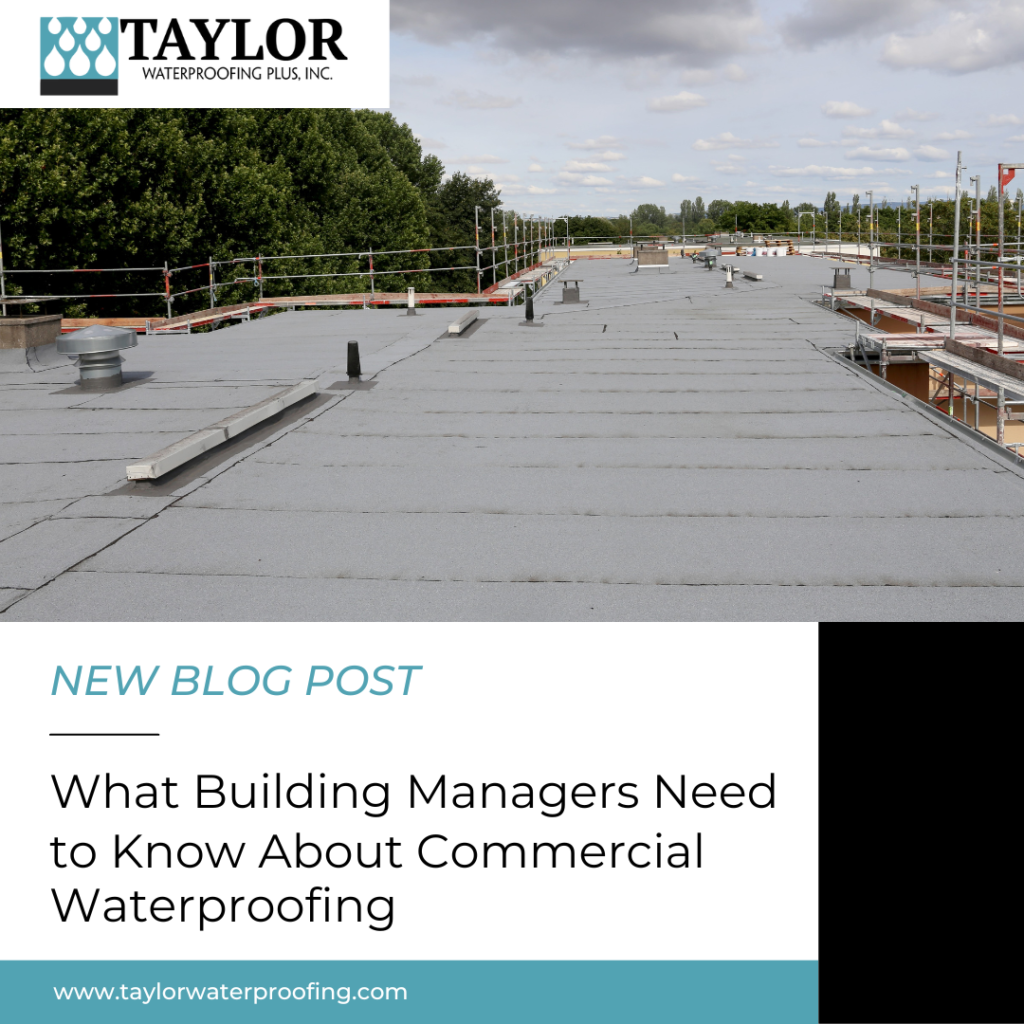
What Building Managers Need to Know about Commercial Waterproofing
If you own or manage a commercial building, your schedule is probably packed with a long to-do list. One thing that sometimes gets overlooked is waterproofing and inspections. This is a mistake when trying to protect and maintain the building. Being proactive with waterproofing will save you money in the long run on costly repairs. Here are some important things that building managers need to know about commercial waterproofing.
Why is Commercial Waterproofing Important?
Water damage not only causes cosmetic damage but can be detrimental to the health of the building occupants and cause structural damage to your building. If left untreated, water damage can cause mold and mildew growth in the building, causing health concerns. Waterproofing before these damages occur can ensure the longevity of your building and save you on repairs.
What Causes Leaks or Other Water Damage?
There are many places where water damage and leaks can happen. Water can leak out of pipes, from the roof, and even infiltrate the walls and interior of the building through concrete. A professional will assess the damage and determine the cause.
Using the Right Sealant
There are many different types of sealants and coatings that are made from different materials, such as silicone, acrylic, and polyurethane. Some sealants go on clear or glossy, while some act more as paint. Others have a thicker consistency for filling in gaps and joints. The one you decide on will be based on your waterproofing goals, the material you’re planning on waterproofing, and the aesthetic you are trying to achieve. Our team can give you all your options and help you pick what material is right for your project and building.
Concrete Needs to be Waterproofed
Whether it’s the concrete of the foundation, in the parking garage, or the floors inside of your building, concrete needs to be waterproofed. Water can seep into the pores of the concrete and cause the metal reinforcement to corrode or cause water damage to the surrounding areas. There are many options for waterproofing concrete and depends on where the concrete is located.
Inspections are Key
When it comes to waterproofing, inspections will help you stay proactive. A professional inspection will pinpoint where there is damage or where there could potentially be damage in the future and assess if any materials or sealants need to be replaced. This will prevent water intrusion and stop any leaks from getting worse.
Our team can help building managers and owners with any of the above and more. Your building will be in good hands with our trained and experienced waterproofing professionals. Contact us here to learn more about waterproofing your building.
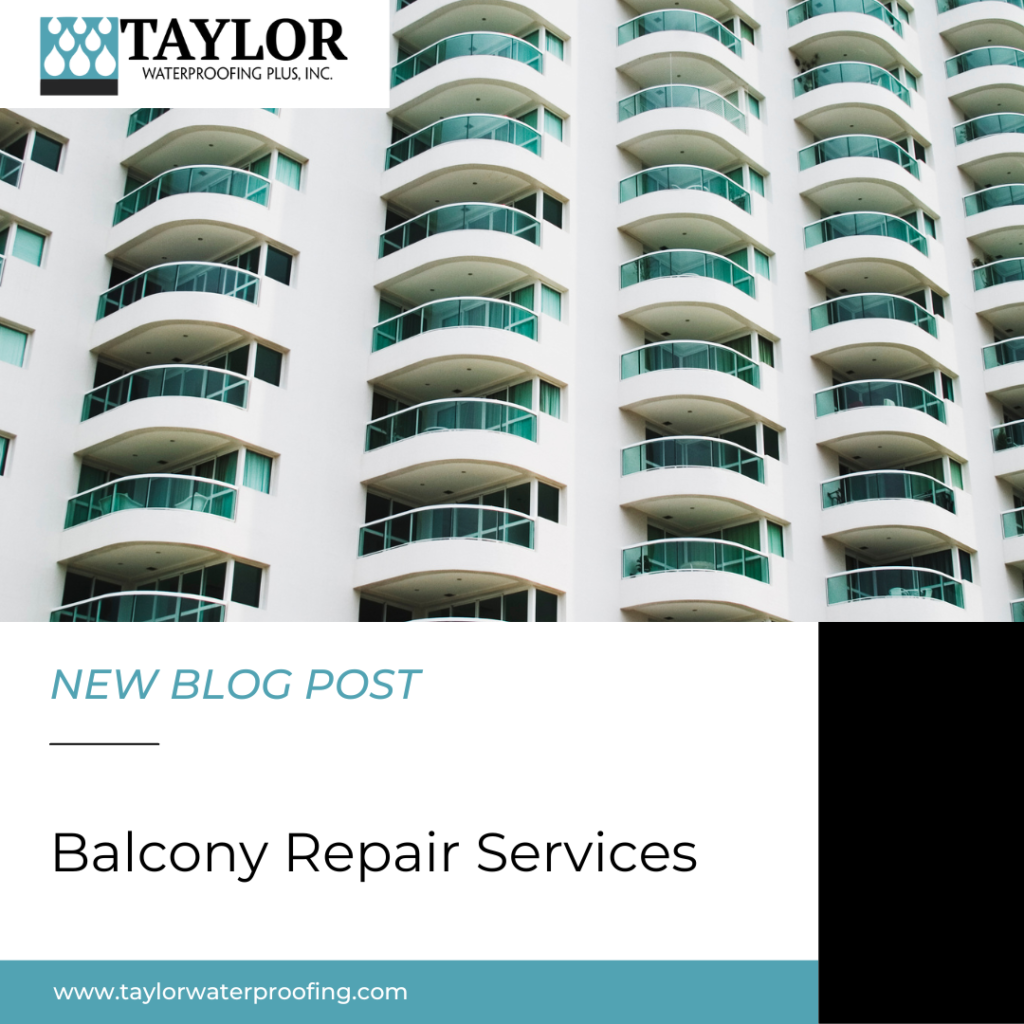
Commercial Balcony Repair Services
If your commercial building has a balcony accessible to clients or employees, you’ll want to make sure the balcony is in good condition. Our team offers a variety of balcony repair and preventive maintenance services that not only help the aesthetics of your building but increase safety. Balconies can be constructed with many different materials. Our team works with sealants and coatings for a wide variety of materials so you can be assured your balcony is properly waterproofed or repaired.
Waterproofing Your Balcony
There are many different types of products and ways to waterproof your balcony, depending on the material and if it is new construction or existing.
Liquid Membrane – If it is an existing balcony and in good condition, we can apply a sealant or coating directly on the surface. This will create a barrier so water cannot soak into the concrete or wood.
Rolled Membrane – Another popular waterproofing option is a rolled membrane. This is a sheet of rubberized asphalt or other waterproof material. It can be self-adhering or heat-welded. These sheets are placed on the decking and installed before the concrete slab.
Balcony Concrete Repair
Like other concrete in your building, if the concrete that makes up your balconies is not waterproofed properly, it could be at risk of corrosion. Water can soak into the pores of the concrete and corrode the steel reinforcing bars. You could also see cracks, spalling, and scaling on the surface. If the concrete is compromised, our team can rebuild it and make sure it is structurally sound.
Install New Railings
The railing is one of the most important safety features of a balcony and must have a height of at least 36 inches. They can also be customized to fit your design needs and add to the aesthetic of your commercial building.
It is extremely important to keep your balcony safe and up-to-date on repairs. Our team can help with all of your commercial balcony repair and preventive maintenance. Learn more on our website and contact us here to talk to one of our team members about your balcony needs.
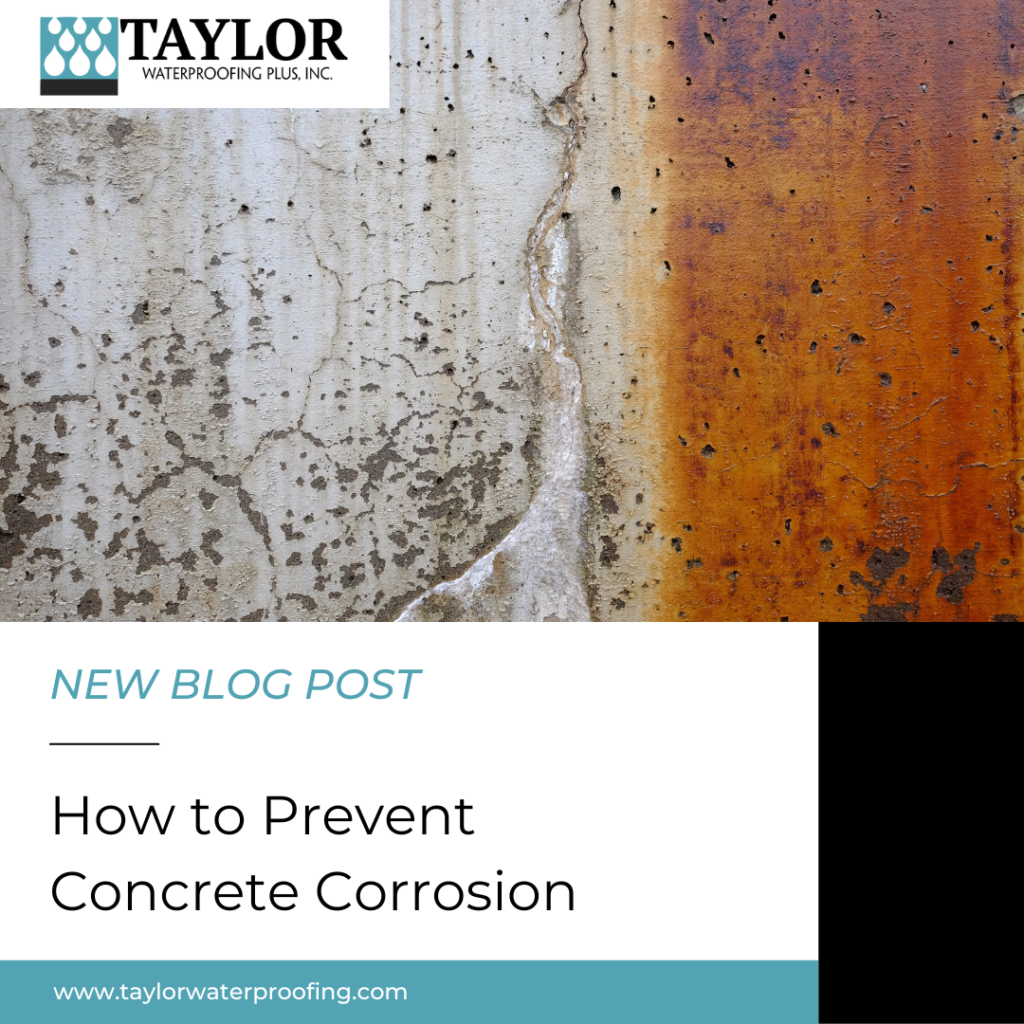
How to Prevent Concrete Corrosion
What Causes Concrete Corrosion?
When carbon dioxide enters the pores of the concrete, it creates carbonic acids or concrete carbonation. This makes it easier for chlorides (salts) to break down the reinforcement rods. The rust on the rods can increase the original size of the rods by six times. This type of corrosion, also referred to as concrete cancer, usually goes unnoticed for years until it starts to break and chip away at the surface of the concrete.
There are other factors that can cause damage to your concrete, such as temperature changes, chemicals, and oils. If water gets into the pores of the concrete in the winter, it can expand and crack the concrete as the water freezes.
How to Prevent Concrete Corrosion?
The best way to prevent your concrete from corrosion and extend the life is to apply a sealant. This creates a hydrophobic barrier that water can’t penetrate. Besides preventing water infiltration, concrete sealers also protect against UV rays, salts, oils, and other chemicals. There are many types of concrete sealants and water repellents, depending on the concrete location and the look you want to achieve.
Protecting your concrete from corrosion is just one of the many benefits of concrete sealant. Other Benefits of Concrete Sealant:
–Protects against mold and mildew – Mold and Mildew can grow if the concrete is wet and doesn’t dry. Since the sealant acts as a water barrier, the pores are sealed and mold and mildew can’t grow within the concrete.
-Improves the appearance of the concrete – Sealants help the concrete look like new. There are also different tints, glosses, and colors so you can customize the look of your building.
-Increases the concrete’s longevity – Your concrete will last much longer with a sealant because it prevents and reduces damage.
Our team is highly skilled in sealing and repairing concrete. We can help you choose what sealant is right for the job. Give us a call or contact us through our website here to talk to one of our team members about your building’s needs.
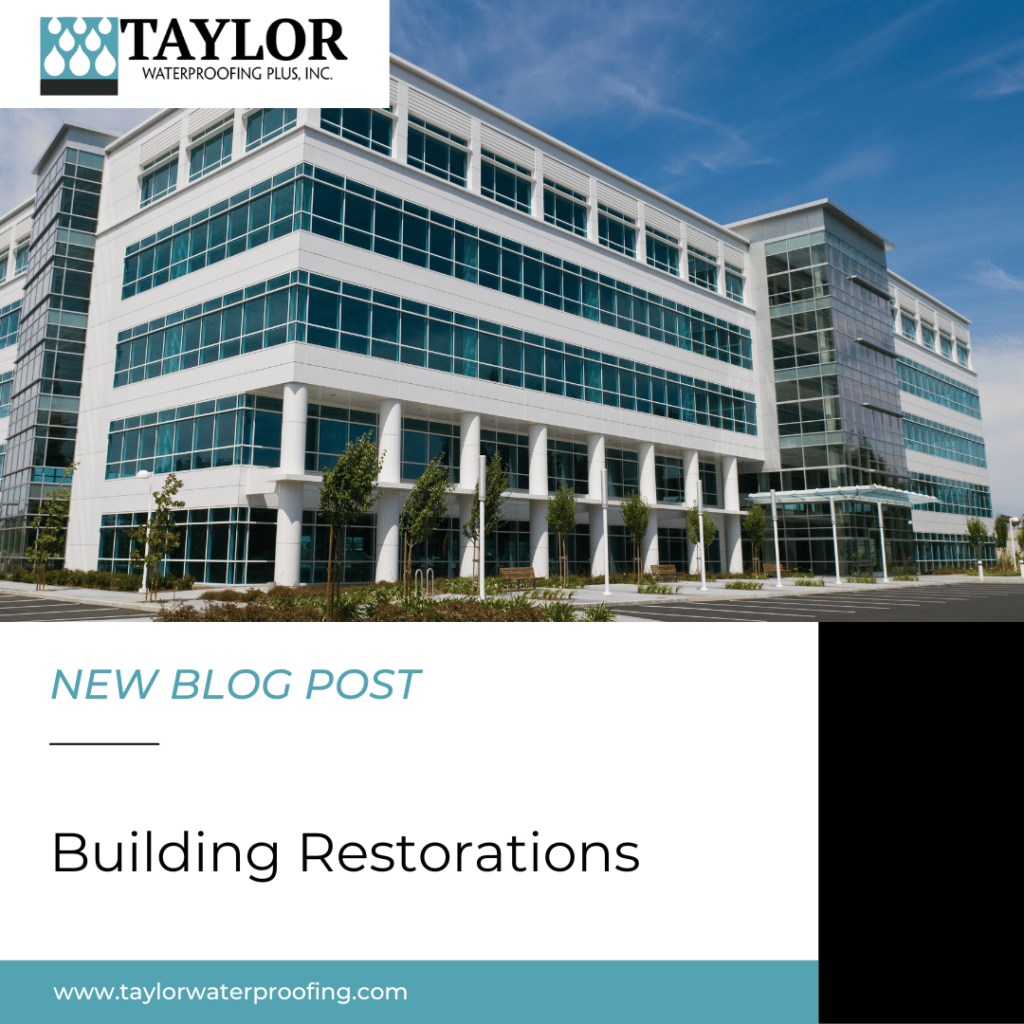
Building Restorations
Whether a building is an investment, has historical significance, or both, wear and tear on the building can cause issues over time that require building restorations. Your building is a unique structure and is made up of specific materials. Our team can identify the services your building needs for restoration and use quality materials for the job.
Building Restoration Services:
Structural Inspections: If you see cracks in the wall or floors, chipping bricks, water damage, or other issues with your building, it may be tempting to hire someone to fix just that issue, but sometimes the damage can run deeper. Our team can perform a structural inspection to make sure there isn’t a bigger cause and get to the root of the problem.
Historical restoration: When you have a historical building, you want to make sure the team you hire will take the best care during the building restorations.
Brick and Stone Repair: Not only does brick and stone repair help the aesthetic of the building, it can play a huge role in making sure your building is structurally sound. If there are gaps or cracks in the brick or stone, water can leak through and cause issues on the interior of your building.
Concrete Repair: Our team can repair both surface concrete and structural concrete. Over time, cracks in the concrete can lead to corrosion within the slabs and cause it to chip and break. There are different techniques for concrete repair such as grout injections and resurfacing.
Sealants and Coatings: Once the repairs are made, it may be a good idea to apply a sealant or coating to the area, depending on the material and location. This will help prevent wear and tear and water infiltration. Our team can make a recommendation on what type of sealant or coating needs to be used.
Making sure you choose an experienced waterproofing team to perform your building restorations is vital in protecting your property in the future. Our team has the proper qualifications, certifications, and training to make sure your building is in tip top shape. Give us a call today or contact us here to talk about your building restoration needs.
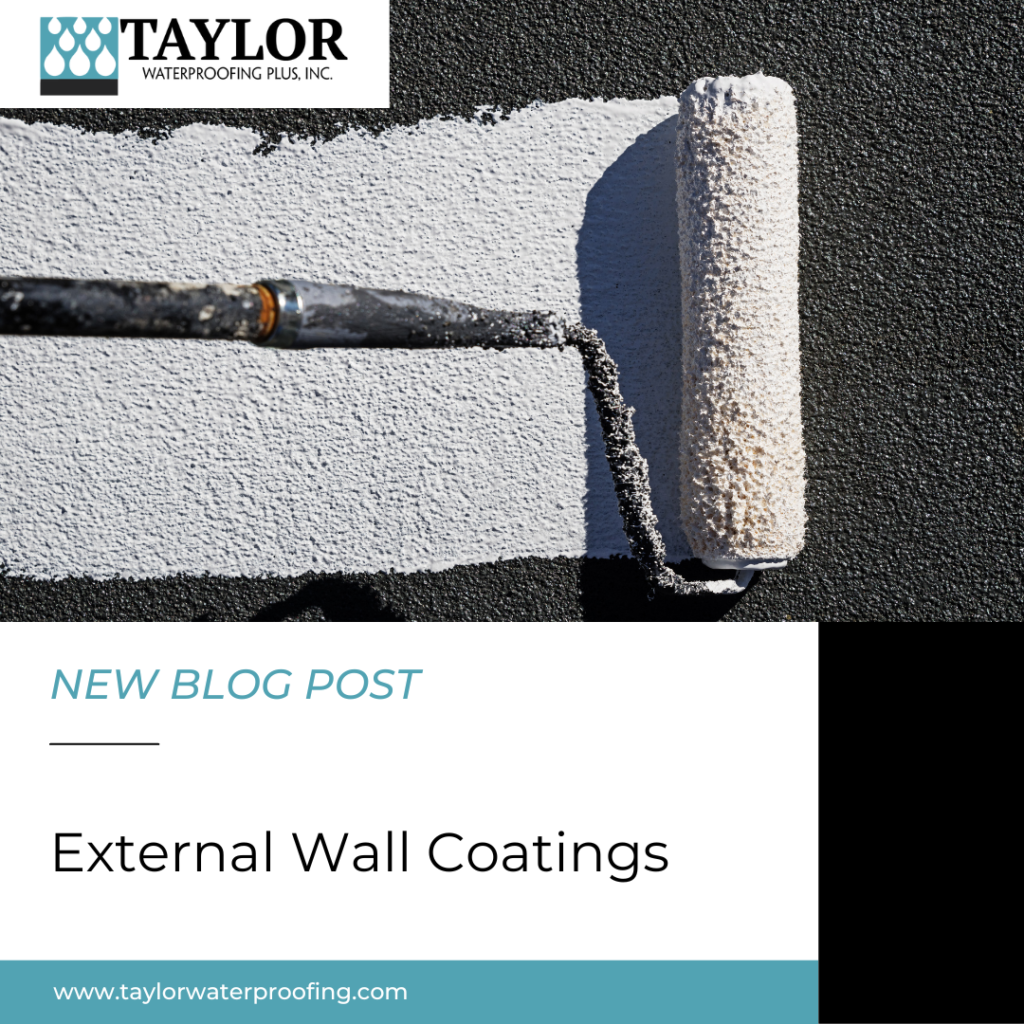
External Wall Coating
What is an External Wall Coating?
External Wall Coatings are elastomeric coatings that are applied like paint on the outside of your building. This protects the building from becoming damaged. These coatings act as a moisture and chemical barrier.
Benefits
- Concrete is constructed with steel bars for reinforcement that are prone to corrosion when cracks in the concrete allow water to enter. Wall coatings extend the life of your building by protecting against corrosion and outside exposure, such as dirt, chemicals, moisture, UV rays, and more.
- Wall coatings are usually done in thicker layers than paint, so you can cover the wall’s imperfections and blemishes.
- These coatings also improve the appearance of your building. They come in different colors and styles. They also prevent the walls from chipping, cracking, and breaking.
Types of Elastomeric Wall Coatings
There are different types of elastomeric coatings to choose from. They can be water-based or resin-based and become flexible and stretchable once dried. This helps prevent the coating from cracking or chipping as your building expands and contracts over time. These coatings are the leading coatings in the industry for waterproofing external walls and structures.
Epoxy – Many people associate epoxy with floor and garage coatings, but there are epoxy coatings created for vertical use. These epoxy products are chemical and abrasion-resistant and compatible with concrete, wood, brick, and stone walls.
Urethane – Not only do urethane coatings offer waterproofing properties, but they are also resistant to mechanical damage. This makes them perfect for industrial applications.
Silicone – These coatings are resin-based and are highly resistant to being washed away and better at withstanding weathering compared to some acrylic coatings.
Having an external wall coating installed is a great way to protect your building and concrete. Without a wall coating, your building is exposed to the elements and could have water infiltration and damage down the road. This could lead to crumbling walls, structural issues, mold growth, and even structural failure. Contact us today to talk to one of our waterproofing experts about your building’s needs.
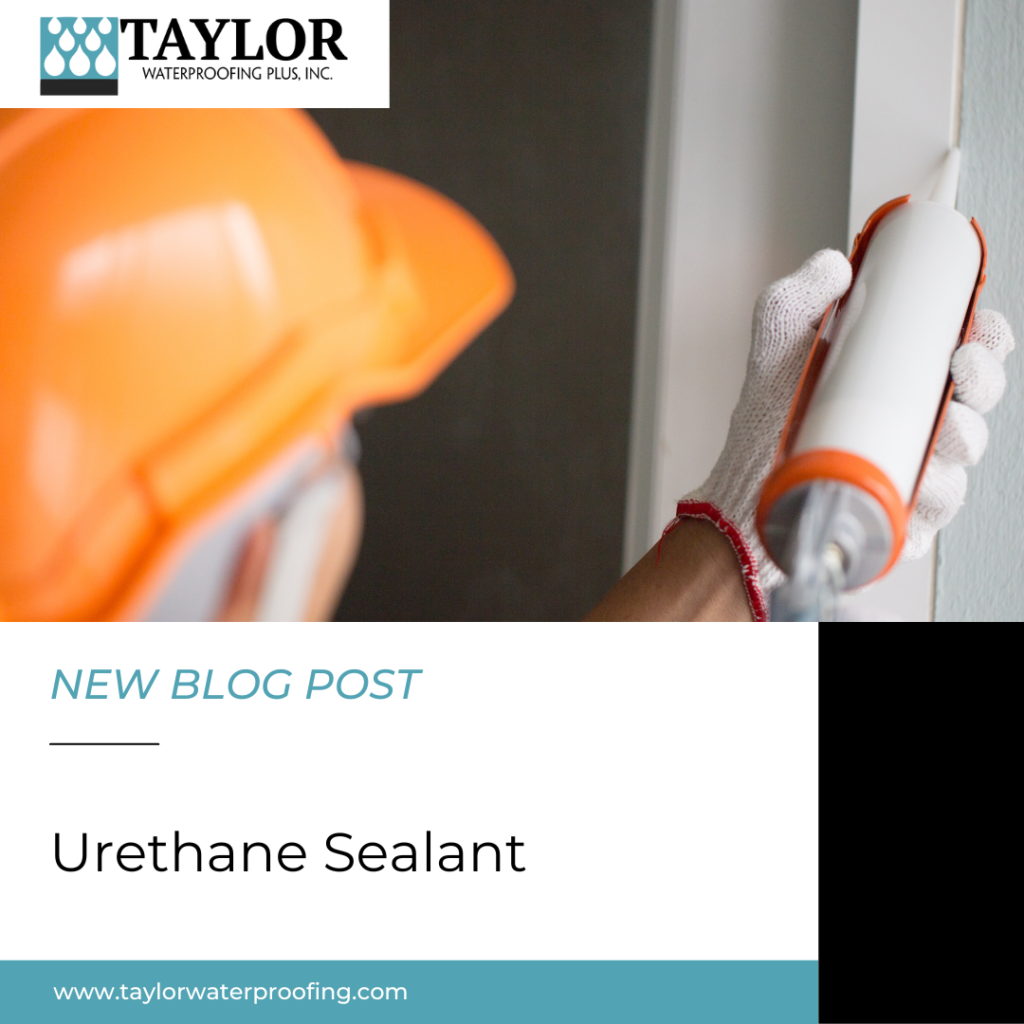
Urethane Sealant
What is Urethane?
Urethane is a chemical compound used in many everyday items. When used in liquid form, it makes great sealants and coating for commercial building applications. It’s a versatile material that has been widely used in the waterproofing industry. Urethane sealant is an excellent choice for sealing various types of surfaces, such as concrete, metal, and wood. It is a highly durable material that can withstand extreme weather conditions, making it ideal for outdoor applications.
Benefits
- Versatility: This sealant can be used on a wide range of surfaces, including concrete, metal, wood, and plastic, and can be used on both horizontal and vertical surfaces.
- Durability: Urethane sealant is highly resistant to weather and abrasion, making it a long-lasting choice for sealing joints and gaps. Urethane sealant is also resistant to water, oil, and chemicals, which makes it a popular choice for sealing parking garages, industrial structures, and other areas that come into contact with these substances.
- Flexibility: One of the main benefits of urethane sealant is its flexibility. Urethane sealant remains flexible even in extreme temperatures, allowing it to expand and contract without cracking or breaking.
- Adhesion: Urethane sealant forms a strong bond with surfaces, providing excellent adhesion and preventing moisture from penetrating joints and gaps, in return, protecting your commercial building from water infiltration.
- Paintability: These sealants can be painted over once it has cured, allowing it to blend seamlessly with surrounding surfaces.
Uses
The compound is a vital ingredient in many types of sealants and coatings. Some of the most common uses of this sealant in the waterproofing industry include sealing joints in concrete structures, such as parking garages. It is also used to seal roofs, walls, and other surfaces that are exposed to the elements. This sealant is an excellent choice for these applications because it can provide a long-lasting, watertight seal that can withstand harsh weather conditions.
Urethane is a great option for many applications and brings many benefits to the table. Whether you need to seal an expansion joint or the concrete in your parking garage, urethane sealant is a reliable and durable solution that can provide long-lasting protection. Contact us today to talk to one of our team members about your commercial waterproofing needs.

